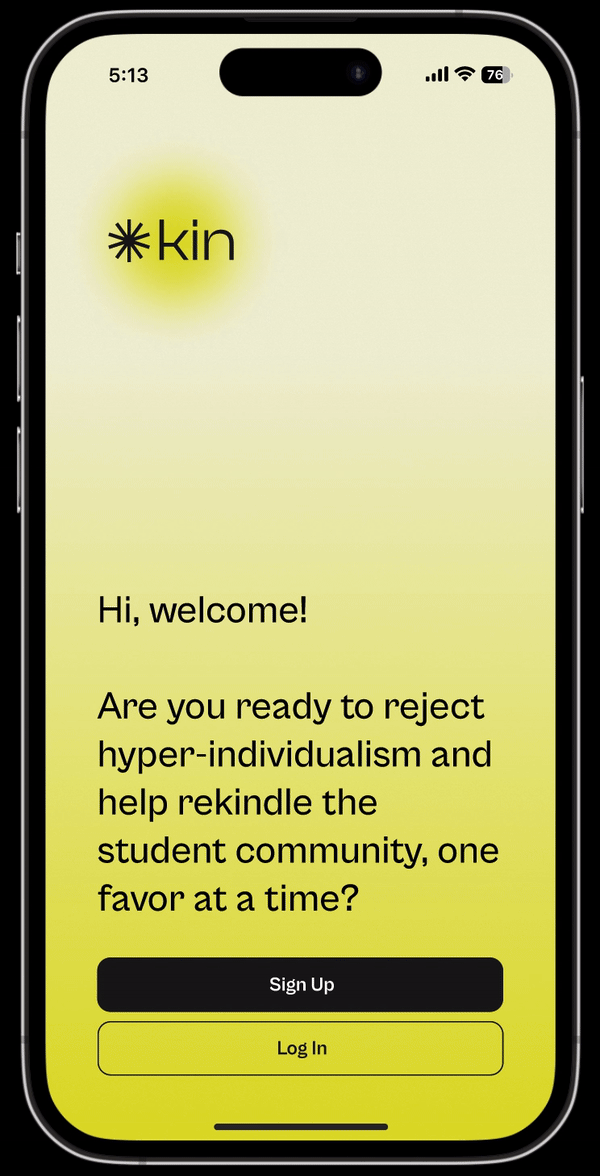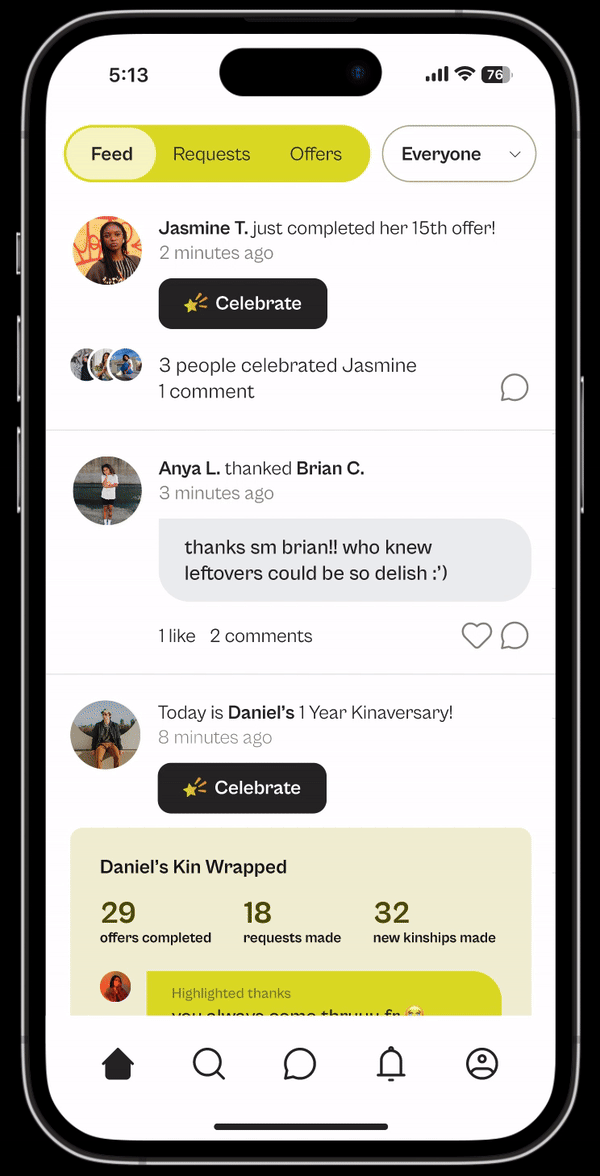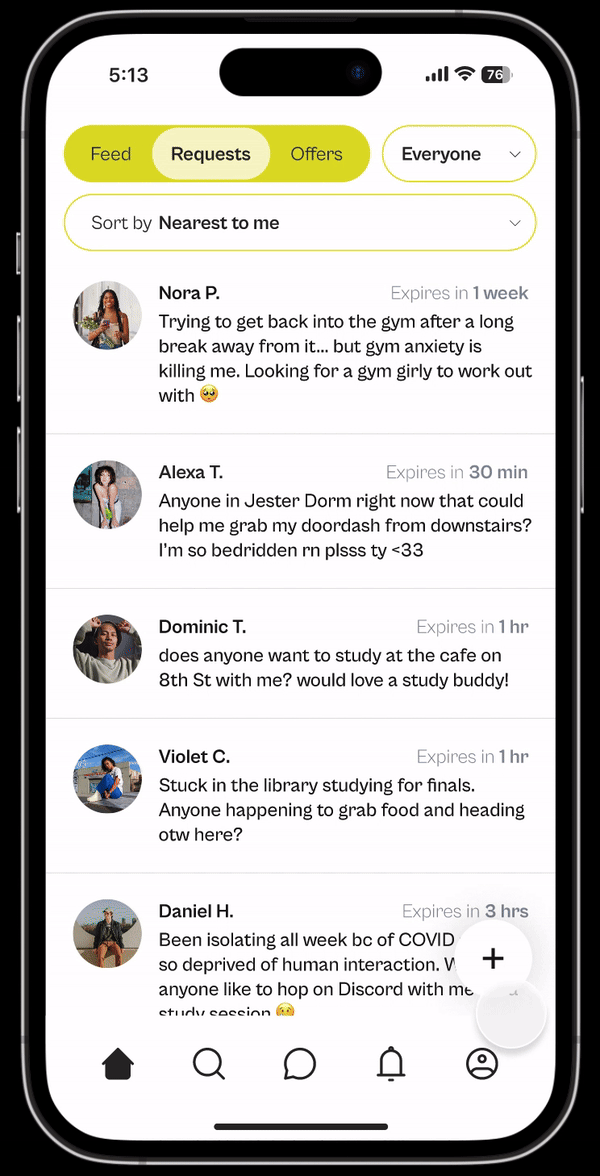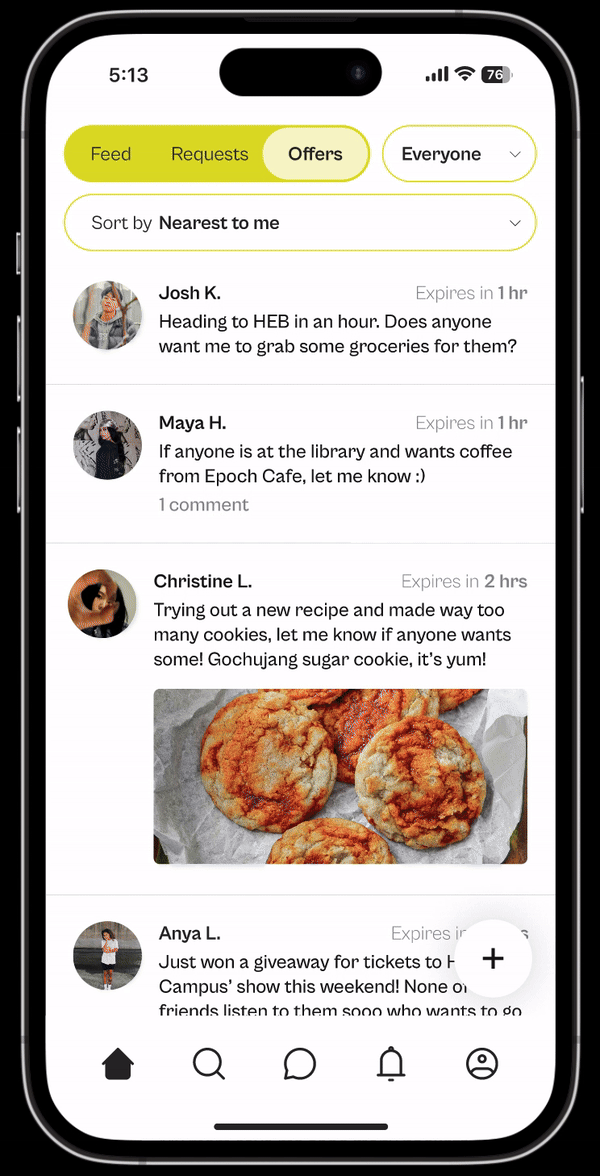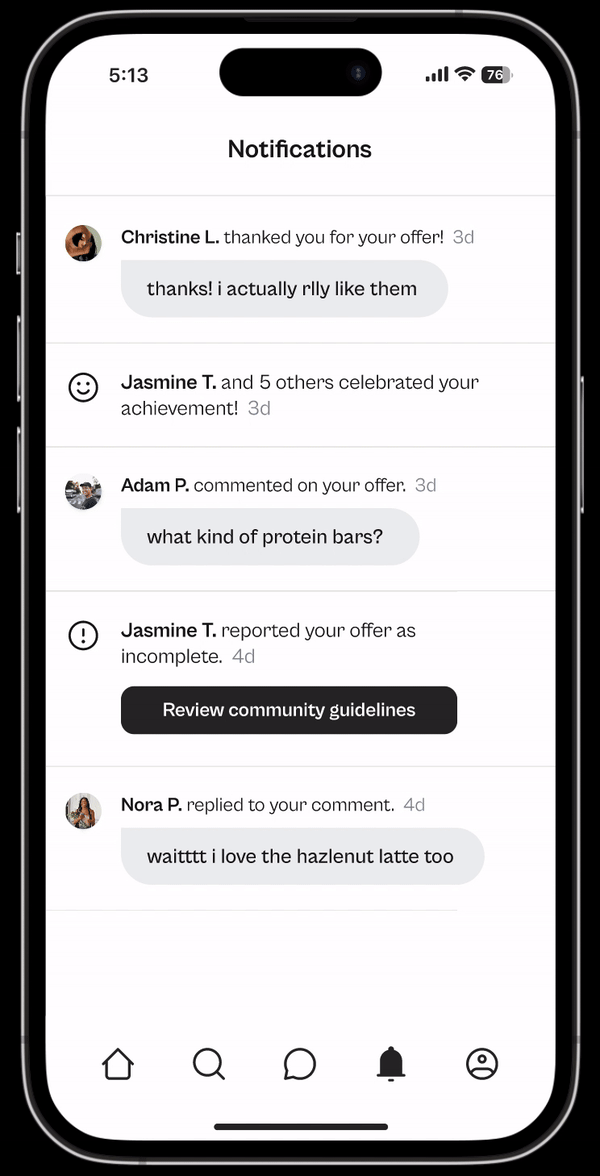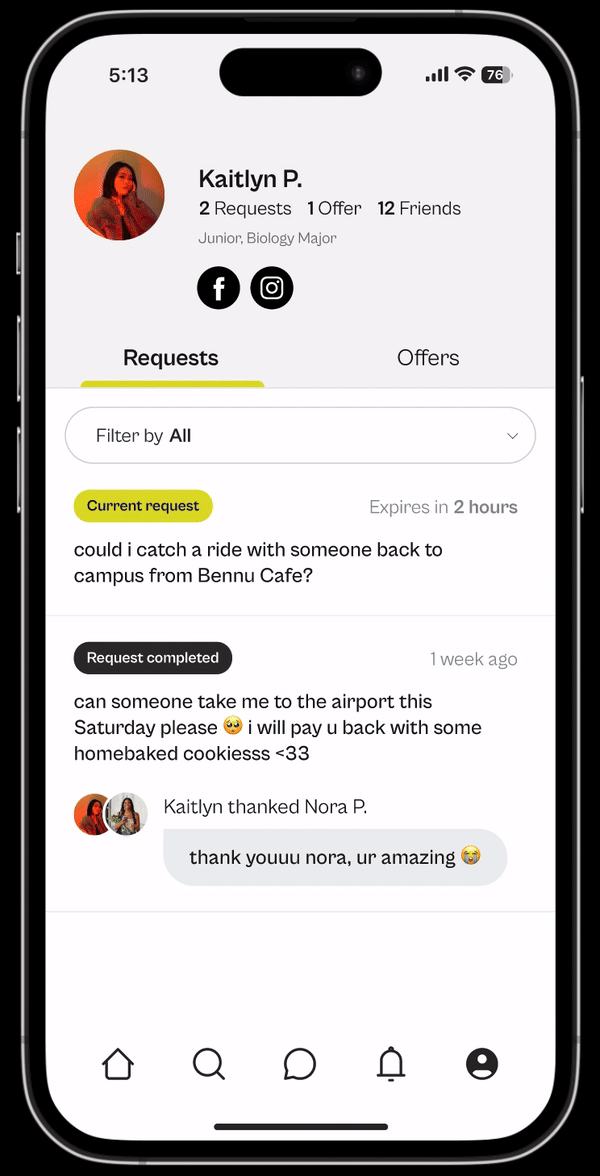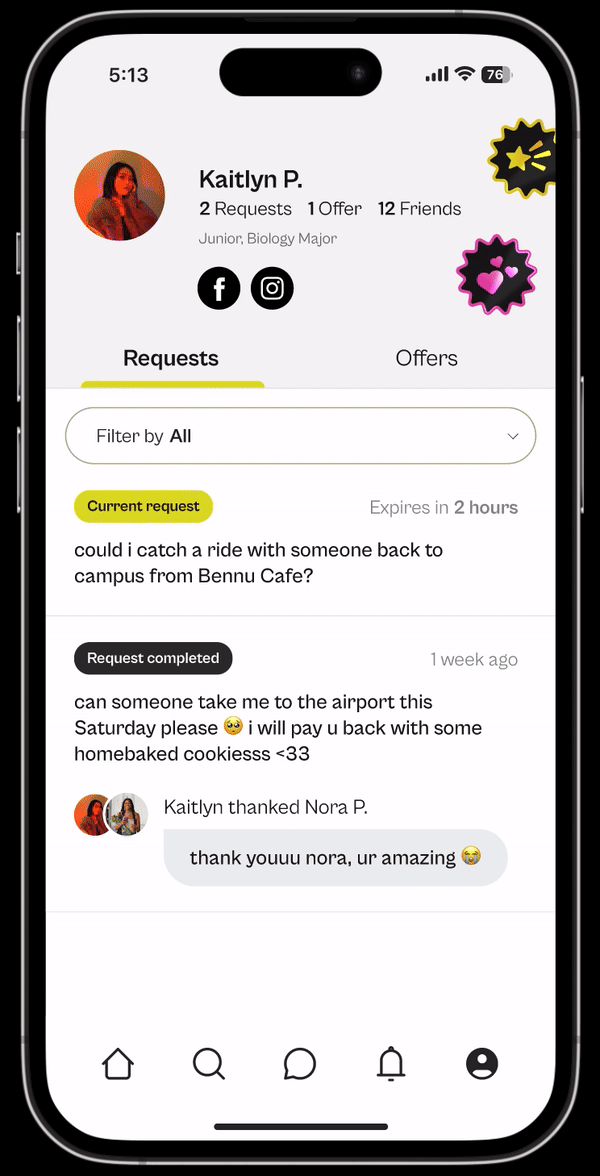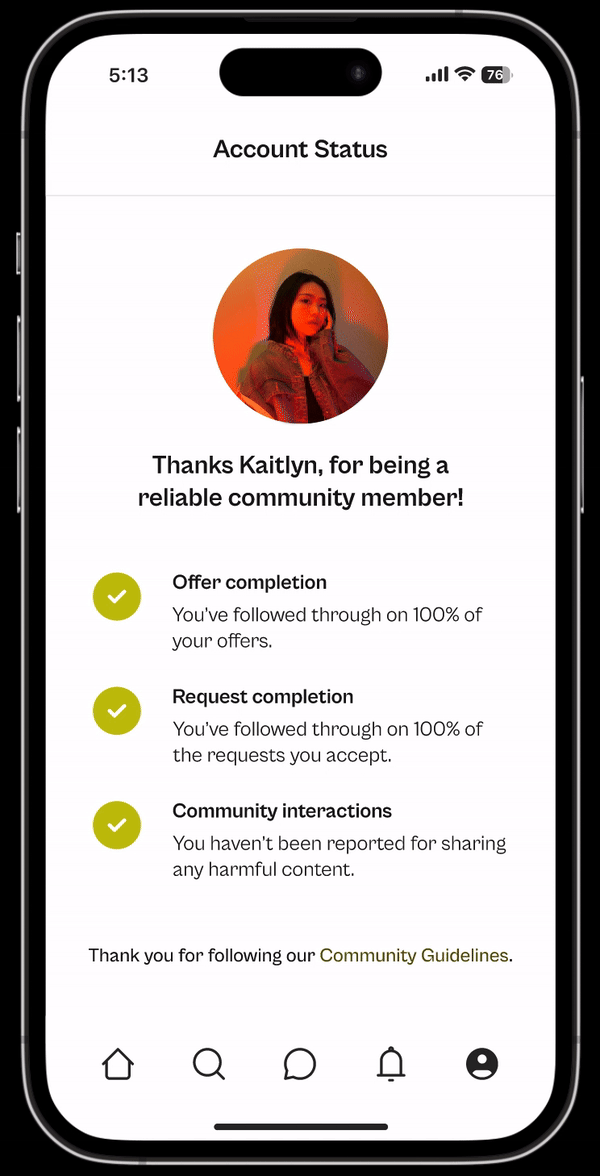
Overview
The emphasis on hyper-indivualism and self-care is causing a decline in student community well-being.
KIN is a community-based app for students that aims to destigmatize asking for help, redefine forms of labor as acts of love, and foster support systems.
The Problem
01
02
Students are struggling to navigate their academic journey without a support system on campus.
There’s a stigma around asking for help that drives students into further isolation away from their friends.
71%
said they have a friend group whom they feel comfortable asking favors from but more than half of them say they actively avoid doing so
I sent out a survey to the students of UT Austin — there were 78 respondents across all four undergraduate years and of various majors ranging from visual arts to pre-med.
62%
said they experience loneliness and/or lack a support system on campus
32%
said they experience psychological distress, such as depression and sleep deprivation
100%
said they would be more than happy to do favors for their friends if they were asked, but some said they can’t remember the last time someone asked them to do a significant favor.
58%
of those with psychological issues said they feel like they neglect their most basic needs
The Problem
01
Students are struggling to navigate their academic journey without a support system on campus.
I sent out a survey to the students of UT Austin — there were 78 respondents across all four undergraduate years and of various majors ranging from visual arts to pre-med.
62%
32%
58%
said they experience loneliness and/or lack a support system on campus
said they experience psychological distress, such as depression and sleep deprivation
of those with psychological issues said they feel like they neglect their most basic needs
The stigma around asking for help is rooted in cultural, psychological, and social factors.
Cultural and Societal Expectations
Psychological Factors
Individualism and Self-Reliance
Many cultures, especially in Western societies, place a high value on individualism and self-reliance. Asking for help can be perceived as a sign of weakness or incompetence, conflicting with the ideal of being self-sufficient.
Perceived Burden
Students are afraid of burdening their friends. They may feel that asking for help imposes on their time or resources.
Fear of Judgement & Vulnerability
There’s an underlying fear of being judged negatively for needing help. Students worry that their community will see them as incapable or needy.
Modern Convenience Services & Social Norms
Technological Alternatives
With the availability of services like Doordash, UberEats, Uber, and Lyft, there is less perceived necessity to ask friends or family for help. These services offer a convenient, transaction-based solution that eliminates the need for personal favors.
Changing Social Norms
As technology becomes more integrated into daily life, social norms are shifting. It is becoming more socially acceptable to rely on services rather than personal networks for certain types of assistance. This shift can further stigmatize asking for help because it deviates from the growing norm of utilizing paid services.
The push for self-care and
hyper-indivdualism is unsustainable.
01
02
Individual interventions can’t fix problems that were caused by larger systematic factors
It fails to address the relentless cycle of toxic productivity and the weight of academic demands
Self-care also only serves as a temporary escape from the burnout culture that students are inevitably trapped in
Hyper-individualism pushes students further into isolation —
preventing social circles from building stronger connections and trust
The concept of self-care promotes the notion that asking others for help means burdening them
The normalization of hyper-individualism is causing an overall decline in collective support and community well-being within college campuses, contributing to the loneliness epidemic
When we’re physically sick, no one expects us to take care of ourselves. So why should mental illnesses be treated any differently?
In an unspoken understanding, we rely on our friends and family to come to our aid so that we can rest, heal, and recover. Although unseen, the difficulties in navigating mental disorders are just as debilitating and painful as the physical ones. Mental illness deserves the same grace we lend our bodies.
Yet, the reality of mental health stigma is that not everyone has a support system. College can be a lonely place for a lot of us. Making lifelong friends who support us in times of need can take emotional and even financial resources –– resources that many students can’t spare.
So... who are we designing for?
Persona 01
Struggling Survivor
Goals
To manage well-being effectively, find balance between academic responsibilities and personal health, and feel less isolated and helpless.
Frustrations
Feeling overwhelmed by academic pressures and personal struggles. Difficulty in reaching out for help due to stigma and feelings of vulnerability.
Needs
Accessible and stigma-free mental health resources. Support networks that provide a sense of community and belonging.
Persona 02
Supportive Friend
Goals
To support friends and maintain strong, healthy relationships, and find balance academic work with personal and social activities.
Frustrations
Not sure what is the best way to show up for their friends without feeling like they’re crossing boundaries or distracting them from their priorities.
Needs
To know how and when is the best way to show up for their community.
“I’ve been in survival mode, and have neglected my well-being completely. There were times where I’ve been bedridden because of my depression, and I’ve never felt so alone & helpless.”
“I try to help out my best friends whenever I can, whether it’s something as small as grabbing them some food or planning mental health break days at the park together.”
Persona 01
Struggling Survivor
Goals
To manage well-being effectively, find balance between academic responsibilities and personal health, and feel less isolated and helpless.
Frustrations
Feeling overwhelmed by academic pressures and personal struggles. Difficulty in reaching out for help due to stigma and feelings of vulnerability.
Needs
Accessible and stigma-free mental health resources. Support networks that provide a sense of community and belonging.
“I’ve been in survival mode, and have neglected my well-being completely. There were times where I’ve been bedridden because of my depression, and I’ve never felt so alone & helpless.”
Persona 02
Supportive Friend
Goals
To support friends and maintain strong, healthy relationships, and find balance academic work with personal and social activities.
Frustrations
Not sure what is the best way to show up for their friends without feeling like they’re crossing boundaries or distracting them from their priorities.
Needs
To know how and when is the best way to show up for their community.
“I try to help out my best friends whenever I can, whether it’s something as small as grabbing them some food or planning mental health break days at the park together.”
It’s time to destigmatize asking for help.
We need community care. Introducing KIN.
01
02
Sign up using your student email and ID
Start off by finding your college, sign up using your student email, and uploading a photo of your student ID. Your profile information will be auto-populated once your student identification is verified.
Laying out the ground rules
Once you've completed the sign-up process, you’ll be guided through KIN’s community guidelines. These guidelines ensure that everyone is joining the community with respect, mutual support, accountability, and a judgement-free mindset.
Onboarding flow
01
02
Connect with the community and explore new connections
The home feed offers a social window into the community’s recent activities. The feed highlights completed offers and requests, new users that recently joined, and noteworthy milestones. You can also tailor your experience by filtering the feed to "Friends only" for a closer look at what your circle is up to.
Celebrate others noteworthy milestones and achievements
The community’s milestones and achievements will be highlighted on the feed— and you can help celebrate when someone has unlocked a new badge, just completed a milestone number of offers, hit their one-year anniversary on the app, etc. Acknowledging others’ achievements not only fosters a sense of community empowerment but also cultivates a culture where peers feel valued for their contributions.
Home activity feed
01
02
03
Normalize asking for help
The requests tab is where we can start breaking the stigma of asking for help! This feed provides a welcoming and comfortable space within the student community for seeking favors from peers. Those who have the time and resources to spare, can accept a request and do a favor for peers in need.
Share your time and resources with the community
The offers tab showcases a feed of peers who want to share their time and resources with the student community. Peers can post their offers, which are available for anyone within the community to claim.
Sorting and filtering out the feed
Students can sort by most recent posts, or by expiration time or distance— depending on which is most convenient for them. The feed can also be filtered to see the entire community or just friends.
Requests and offers
01
Asking for help has never been easier
Students can simply just create a post, describing the favor in need. The expiration date indicates when they’ll need the favor by, and they can specify the favor by adding location details and uploading a photo.
Creating a request
01
Interacting with offers
Students can interact with offers by leaving comments directly under them, or if they are interesting in taking up an offer, they can message the peer directly from the post.
Accepting an offer
01
02
Notification prompt
Students will get a prompt in their notification feed asking for their feedback after a request or offer has been marked as completed.
Feedback flow
Students will verify task completion by their peers and then leave a thank-you note, which will be publicly posted on their peer’s profile page. Receiving gratitude and feedback from the community helps build their credibility for future favors.
Sharing feedback
01
02
Past activity
On the profile page, all past activity regarding requests and offers will be displayed. Each post will include the status—whether it's an ongoing request or offer, or if it has been successfully completed. Additionally, users can view public feedback and thank-you notes, both their own and those from other peers.
Personal information, friends, and social links
The only personal information that will be shown on the profile is year classification and major. The friends list is publicly visible to foster community transparency. Additionally, students have the option to link their social media accounts, to expand connections or build their credibility.
Profile
03
Milestone badges
The home feed offers a social window into the community’s recent activities. The feed highlights completed offers and requests, new users that recently joined, and noteworthy milestones. You can also tailor your experience by filtering the feed to "Friends only" for a closer look at what your circle is up to.
01
Monitoring account status
The account status page lets users know if they’re at risk of losing access to the community when their completion rate for offers and requests are falling low or if they’ve been reported for sharing harmful posts or comments. This empowers users to uphold community standards with responsibility.
Account status






